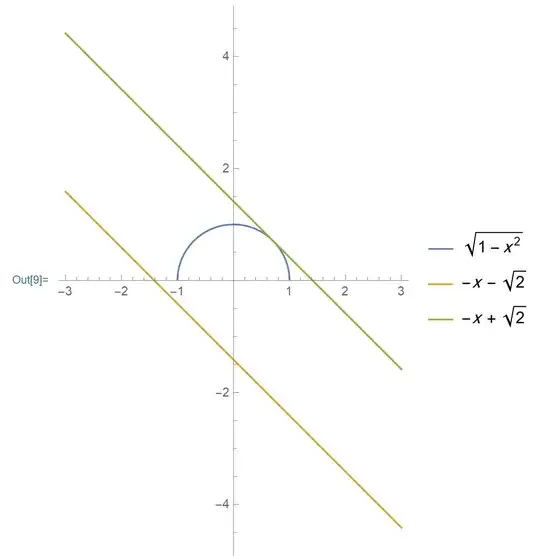The complete solution set of the equation ${\sin ^{ - 1}}\left( {\frac{{x + \sqrt {1 - {x^2}} }}{{\sqrt 2 }}} \right) = \frac{\pi }{4} + {\sin ^{ - 1}}x$ is
(A)[-1,0]
(B)[0,1]
(C)$[-1,\frac{1}{\sqrt{2}}]$
(D)$[\frac{1}{\sqrt{2}},1]$
My approach is as follow
${\sin ^{ - 1}}\left( {\frac{{x + \sqrt {1 - {x^2}} }}{{\sqrt 2 }}} \right) - {\sin ^{ - 1}}x = \frac{\pi }{4}$
${\sin ^{ - 1}}\left( {\left( {\frac{{x + \sqrt {1 - {x^2}} }}{{\sqrt 2 }}} \right)\sqrt {1 - {x^2}} - x\sqrt {1 - {{\left( {\frac{{x + \sqrt {1 - {x^2}} }}{{\sqrt 2 }}} \right)}^2}} } \right) = \frac{\pi }{4}$
${\sin ^{ - 1}}\left( {\left( {\frac{{x\sqrt {1 - {x^2}} + 1 - {x^2}}}{{\sqrt 2 }}} \right) - x\sqrt {1 - \left( {\frac{{{x^2} + 1 - {x^2} + 2x\sqrt {1 - {x^2}} }}{2}} \right)} } \right) = \frac{\pi }{4}$
${\sin ^{ - 1}}\left( {\left( {\frac{{x\sqrt {1 - {x^2}} + 1 - {x^2}}}{{\sqrt 2 }}} \right) - x\sqrt {\left( {\frac{{2 - 1 - 2x\sqrt {1 - {x^2}} }}{2}} \right)} } \right) = \frac{\pi }{4}$
$\left( {\left( {\frac{{x\sqrt {1 - {x^2}} + 1 - {x^2}}}{{\sqrt 2 }}} \right) - x\sqrt {\left( {\frac{{1 - 2x\sqrt {1 - {x^2}} }}{2}} \right)} } \right) = \frac{1}{{\sqrt 2 }}$
Not able to proceed from here
